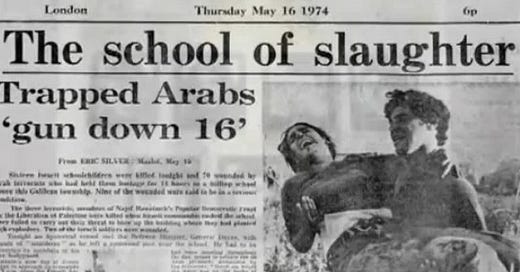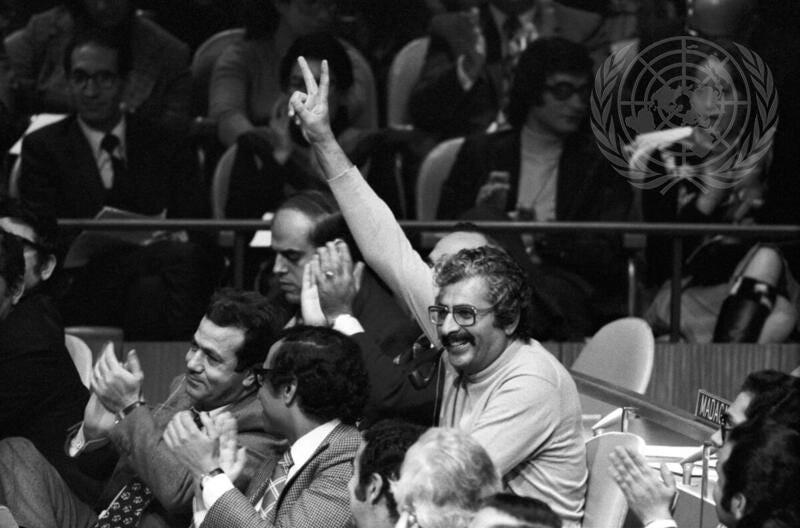This is a guest post from Toronto writer Dave Gordon. Gordon is a freelance writer and editor. His work has been published in the Washington Times, New York Times, National Post, Globe and Mail, BBC, and other A-list media. He was bred in Toronto, buttered in Brooklyn.
It’s been said many times: The massacre of Oct. 7 in Israel was the worst slaughter of Jews since the Shoah, when the scope of brutality came as a shock to Israel and global Jewry.
But to those who know history, it was no surprise.
The long list of unabated terror attacks against Jews in the Holy Land over the course of a century adds context, and greater understanding, to how our various enemies have found any way they can to destroy us. For our enemies, it is an ongoing war to annihilate the infidel. For the Jewish people, a fight for our rights to live freely in our ancestral homeland.
This year marks the fiftieth anniversary of a series of deadly Palestinian terror attacks against Israeli civilians, that – much like so many that came before and after – bore a hole in the souls of our nation, and the victims’ families.
Among the most notorious of these attacks were the Kiryat Shmona massacre, the Ma'alot massacre, and the tragic incidents in Nahariya, Beit She'an, and the bombing of TWA Flight 841. Because of the unfortunate passing of time, few people probably know about these – let alone remember. It is important to honor the memory of the victims, and recognize that Islamic extremist evil has been a virus in the Land for many generations.
Kiryat Shmona
On April 11, during Pesach, three members of the Popular Front for the Liberation of Palestine infiltrated Israel from Lebanon, entered an apartment building in Kiryat Shmona, and massacred eighteen residents, half of whom were children. This atrocity prompted about 40% of the town's population to relocate.
Ma’alot
On May 15, Palestinian terrorists from the Democratic Front for the Liberation of Palestine, disguised as Israeli soldiers, crossed into Israel from Lebanon. They first killed a couple and their 4-year-old son in Ma'alot before seizing a local school, taking 105 students and 10 teachers hostage. They demanded the release of 23 Palestinian prisoners, threatening to kill the students. When the Israeli Golani Brigade stormed the building on the second day, the terrorists detonated grenades and opened fire, resulting in the deaths of 25 hostages, including 22 children, and injuring 68 others. Ma'alot, a town established in 1957 by Jewish immigrants from Morocco and Tunisia, was deeply affected by this tragedy.
Nahariya
Fifty years ago this week, from June 24 to 25, three Palestinian terrorists infiltrated Nahariya by sea from Lebanon, marking the first maritime incursion of its kind into Israel. The attack claimed the lives of three civilians and one Israeli soldier.
TWA Flight 841
On September 8, a TWA Flight 841 jet traveling from Tel Aviv to Athens was bombed by PFLP militants, causing the plane to crash into the Ionian Sea and killing all 88 passengers and crew members on board.
Beit She’an
On November 19, a squad from the Democratic Front for the Liberation of Palestine attacked Beit She'an, killing four civilians and injuring more than 20 others. The attackers were eventually killed by Israeli special forces.
Resolution 3236
On November 22, 1974, the United Nations General Assembly adopted Resolution 3236, which recognized the “Palestinian right to self-determination” and established official UN contact with the Palestine Liberation Organization. About a year after the Yom Kippur War, when the Arab nations again attempted to wipe Israel off the map, and in light of a slew of terror attacks, the world body, much like today, sought to reward terror.
The Resolution demanded that the Palestinians who fled in 1947 be permitted to return to the homes they fled from, and have the “right” to resettle in Israel. Yet, this resolution not only failed to speak of any negotiated settlement, it also did not address the corresponding plight of the 800,000 Jews who were expelled from Arab countries.
This is a painful reminder of the ongoing struggle faced by Israel and its people. It underscores the need for vigilance, security and safety, and the riddance of extremist hate.
Lest we forget the sacrifices made by our brethren in Eretz Yisrael both yesterday and today.
Shabbat shalom







